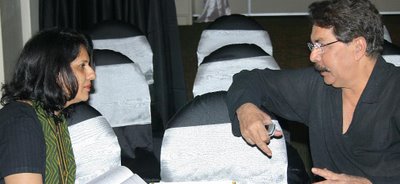
Arakkal at the book launch at Kochi
Review
- In Touch With My Roots:
A Creative Journey Through Kerala
By Yusuf Arakkal
Penguin,
Rs 1250 - One of the most telling images in Yusuf Arakkal’s book In Touch With My Roots is an oil painting titled “Tea Kada”: it reveals the dilemma of the hyphenated self. He has used an unusual combo of English and Malayalam to title the ubiquitous wayside teashop in rural Kerala! The artist who had spent his early years in Kerala had in his teens sought Bangalore and made it his adopted home. When he embarked on a 15-day “creative journey” through Kerala in 2001 to rediscover his roots, there was much he could not comprehend. He says, “Here was I — a non-resident Keralite who loved his hometown but found it difficult to comprehend the psyche of the locals and his land.”
He begins his musings with “Kerala is colours — magnificent colours” and details the varied hues of green Kerala: striking emerald, viridian and sap. “Starting from the dark green grass –so dark you will feel the colour will come out on your fingers if you so much as touch it.” But the vibrant colours, green and others, somehow escape his brush and paradoxically his evocations of Kerala are somber and dark. The mood is predominantly one of despair, which is characteristic of Arakkal’s works. Says Arakkal, “I lost my parents at a very early age and even if I had a happy childhood, I have always used earth colours in my paintings and this is not a conscious effort. And the character of my work has evolved over the years.”
Arakkal’s memories of Kerala are steeped in legends and he has infused it into his work. As a 10-year-old he had heard the story of the Rapayyi Mappila who sold coconut oil at the local market. “The old man sitting next to me on the wayside teashop bench began this story. ‘Rapayyi Mappila sold coconut oil at our local weekend market. He must have been in his late sixties at that time. But very sturdy. I was buying fish next door when I heard the commotion at Rapayyi Mappila’s store. I saw four mean and very menacing looking men shouting abuses at him. He merely smiled and asked them to leave. But suddenly one of them pounced on him. Rapayyi Mappila stood there like a rock and just pointed his index finger at them, as if shooting a pistol. You know what happened next? …..the old man continued, with a bewildered expression on his face, “they all fell down one by one like trees chopped down. That is choondani murman.” ( Choondani murman is an ancient martial trick that could bring an adversary down by pointing a finger at him.) - Arakkal has searched for the images that haunt his memory. And he has adhered to those images, almost clinging to his past afraid of disturbing his memories. Whether it is the “The Coconut-seller”, “The Fisherman”, “The Karnavar” or in the numerous other portraits, Arakkal has given the common man an aura of mystery.
- These images are interspersed with those of boats. And the Kerala boats that Arakkal loves to draw are imbued with their own legends. “Do you only draw boats?” asks Bijumon. One of the happiest sketches in the book is of Bijumon. The artist says, “It is a very dear picture. I began to sketch him on the beach and his friends turned into instant critics and they pointed out that his eyes were not so slanted but on the all they seemed to agree it is a good picture.” It is these stories behind few of his paintings that lend colour to the book but the insertion of more anecdotes would have made the book much more interesting.
- The book is filled with grammatical and spelling errors- It seems like Penguin just didn’t have the time to read the few pages of text.
Comments